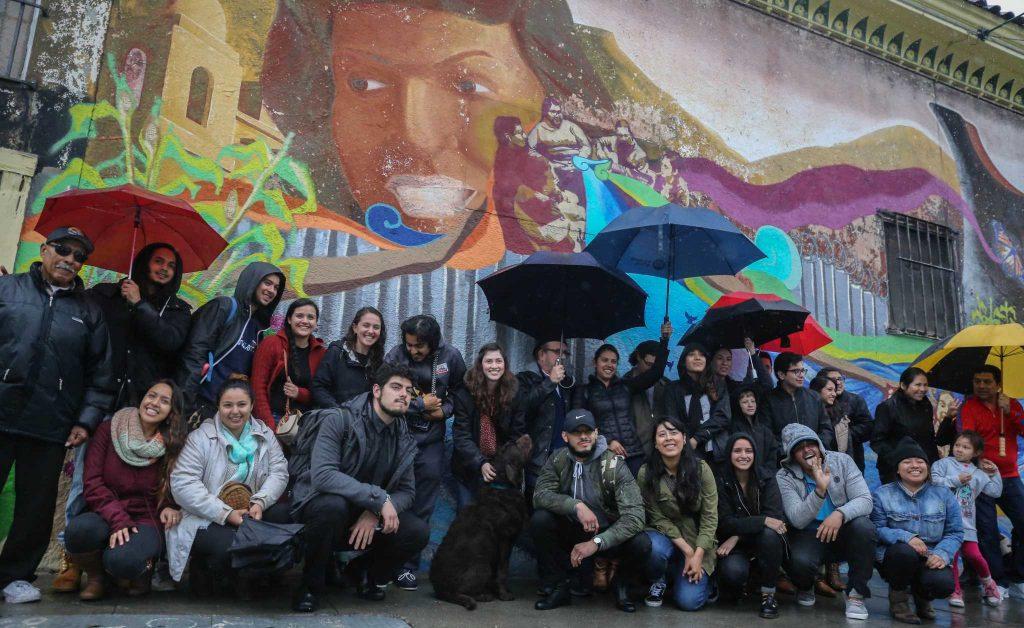Before Yakira Teitel was a medical student at UC San Francisco, she was a muralist. When she started volunteering at Clínica Martín-Baró, she wanted to do something that combined her passion for art and her love for her community. Clínica Martín-Baró is an SF State and UCSF student-organized clinic that provides free healthcare to the Mission District’s immigrant community, both documented and undocumented.
“At first, I taught workshops at the clinic on building community through murals,” Teitel said, gesturing to the vivid frescos adorning the walls of the buildings lining 24th Street. “But going to medical school and working at the clinic took up so much of my time. Now (that) I’m a fourth-year, I don’t volunteer as much, so I finally have the time for this.”

The mural Teitel took part in covers the back wall of La Palma Mexicatessen, a store and restaurant selling house-made Mexican and Central American staples. The mural was made in collaboration between Clínica Martín-Baró and PRIME-US, a medical program that teaches skills for students wanting to provide medical help for urban communities.
Through a partnership with students from SF State’s Latina/Latino studies department and medical students and faculty from UC San Francisco, the clinic helps close gaps in the medical system.
“As a muralist, this is a culmination of all my dreams,” Teitel said in her speech at the mural’s unveiling on March 5. Despite the rain, at least 20 Clínica volunteers and other members of the community came out in support of the mural, which was completed in little more than a month.
“The most amazing part was working with all of you,” Teitel said, drawing cheers from the crowd. “You all played some part of this, through support, making stencils, painting, even modeling for the mural. This mural shows our love for our clinic and our love for our community.”
Every Saturday at the Mission Girls Building on 24th Street, Clínica Martín-Baró provides ongoing care for the Mission’s immigrant communities, relying on donations and fundraising events.
“I wanted to help people, but I also wanted to know the people I help,” said SF State biology major and Clínica volunteer Jennifer Sanchez. “I wanted to volunteer at a place where I could build a relationship with patients and with the community.”
Erick Ramos, a Latina/Latino studies major, calls Clínica Martín-Baró a form of resistance.
“A lot of our patients are considered ‘illegal,’ and as a result don’t get basic human rights like healthcare,” Ramos said. “So we remedy that imbalance through our work at the clinic.”
Currently, 47 out of 58 California counties provide low-cost medical care to undocumented immigrants, according to a Health Access California report released last November. However, according to the report, 39 of the counties restrict treatment to seriously ill patients or children, and only eight offer very limited non-emergency services.

Clínica Martín-Baró, with its guiding philosophy of care with cultural sensitivity, has become an oasis for immigrants living in San Francisco.
“It empowers the community,” said biology major Christian Rivera Nolan. “We approach health and community issues very holistically. We’re moving away from solving problems of the community and instead are committed to helping and working with it.”
Most volunteers speak Spanish, which makes patients feel comfortable, according to Andrea Nieto, a 20-year-old student and volunteer at the clinic.
“It’s important to be part of the community you’re serving,” Nieto said. “If you’re a Spanish-speaking person, you’ll want to talk to another Spanish-speaking person about important things like healthcare.”
Growing up with Spanish-speaking parents, Nieto witnessed first-hand the difficulties non-English speaking people face. Nieto said this alienation is one of the biggest reasons immigrants are so disadvantaged when it comes to the healthcare system.
Stephanie Romero, a volunteer schedule coordinator who graduated from SF State with a bachelor’s degree in Latina/Latino studies, emphasized the clinic’s psychotherapy services, which she said are essential to the immigrant community.
“We tend to ignore mental health issues in our community,” Romero said. “Felix Kury, our director, is a therapist, and he made it clear that you can’t fix something without addressing it. We try to provide not only help, but information for patients.”
Providing access and information are two of the ways Clínica Martín-Baró hopes to help the community.
“Our clinic focuses on so much more than just healthcare in terms of treating disease,” Nieto said. “It’s also about working directly with the community to find out what they need and how we can help. We focus on social issues as well, like displacement and gentrification— things that matter to the community that we can help address.”







